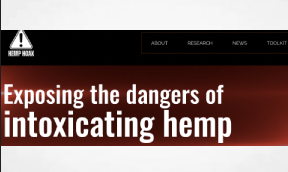HempHoax.com is an educational and advocacy project of the San Diego/Imperial Counties Joint Labor Management Cannabis Committee.
The Press Release
New Report Exposes “The Great Hemp Hoax”: Synthetic Drugs Masquerading as Hemp Products in California
SACRAMENTO, CA — A new analysis of 104 so-called “hemp” products from 68 brands has uncovered a public health crisis in California’s unregulated hemp market.
The white paper, The Great Hemp Hoax, reveals that 95 percent of tested products contained chemically synthesized cannabinoids, which are prohibited in California.
“Much of what’s being sold as ‘hemp; today isn’t hemp at all — it’s a cocktail of synthetic intoxicants and illicit THC masquerading as a natural, legal product. It’s essentially the ultra-processed junk food of cannabis, but far more dangerous,” said Tiffany Devitt, Director of Regulatory Affairs at Groundwork Holdings, Inc. “These companies aren’t just skirting regulations – they’re putting consumers at serious risk with designer drugs that look a whole lot more like ‘Spice’ than natural hemp.”
Laboratory testing also found alarming potency levels:
-
Some gummies contained 32 times more THC than what’s legally allowed in California’s regulated cannabis market.
-
Vape products had THC equivalencies averaging 268% above California’s legal threshold.
-
Nearly half of the tested products contained THCP, a synthetic compound up to 30 times more potent than natural THC.
-
Other products included psychoactive substances such as kratom and hallucinogenic mushrooms — all sold under the guise of hemp.
“We’re not just seeing high-potency THC; we’re seeing an influx of synthetic compounds with unknown health risks,” said Josh Swider, PhD, Co-founder and CEO of Infinite Chemical Analysis Labs. “Many of these substances are unregulated, untested, and more potent than anything found in nature.”
Beyond the public health concerns, these unregulated products are undermining California’s legal cannabis industry and evading taxes:
-
91% of tested products failed to collect California sales taxes.
-
None of the vendors remitted required cannabis excise taxes when required to do so.
“These illicit operations aren’t just dangerous — they’re undercutting California’s regulated cannabis businesses and workers,” said Kristin Heidelbach, Legislative Director of the United Food and Commercial Workers, Western States Council. “While licensed cannabis businesses provide good union jobs and comply with strict labor standards, many synthetic ‘hemp’ producers manufacture out-of-state or import from overseas, dodging California’s labor laws and tax obligations.”
“We’re seeing sophisticated bad actors pushing a new wave of designer drugs, often shipping them across state lines through the U.S. Postal Service — a federal crime — with no age verification or safety oversight,” said Robert Dean, a licensed California Private Investigator and retired homicide sergeant.
“California voters never intended for intoxicating ‘hemp’ products to bypass our regulated cannabis system,” said Amy O’Gorman Jenkins, Executive Director of the California Cannabis Operators Association (CCOA). “Governor Newsom’s emergency regulations were a critical first step, but they expire in March 2025. Their reauthorization is essential. We also urge the Legislature to advance policies that ensure all intoxicating cannabinoid products are subject to robust regulatory oversight and stronger enforcement — especially against online retailers disregarding our consumer protection laws.”




















